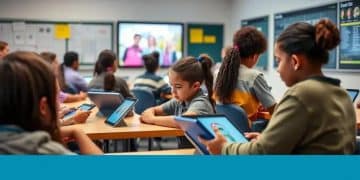Insights on high school coding classes that boost skills

Insights on high school coding classes reveal that they enhance problem-solving skills, foster creativity, and prepare students for various careers in today’s technology-driven world.
Insights on high school coding classes show how these programs inspire creativity in students. Ever thought about how coding can shape future careers? Let’s dive into this fascinating topic.
Importance of coding in modern education
Understanding the importance of coding in modern education is essential for students today. Coding is not just a skill; it’s a way of thinking. Learning to code helps students develop problem-solving skills that are valuable in every field.
With the rise of technology, coding becomes a fundamental skill that all students need. Schools are recognizing this and integrating coding into their curriculums.
Benefits of Learning to Code
When students learn coding, they gain many advantages. It opens doors to new opportunities and enhances their educational experience.
- Encourages creative thinking
- Builds strong problem-solving abilities
- Prepares students for future job markets
- Fosters teamwork and collaboration skills
Coding can also enhance math skills and logical reasoning. As students write code, they learn to break down complex problems into manageable parts. This process mirrors how they might approach challenges in real life.
Making Coding Accessible
Schools are finding innovative ways to teach coding to make it accessible for all students. From after-school clubs to specialized classes, there’s an array of options.
Many educators use platforms like Scratch and Code.org to introduce coding in a fun and engaging way. These resources have made learning to code enjoyable and inviting for students of all ages.
Incorporating coding into the education system equips students with skills they will need in various careers. As technology continues to evolve, having a strong foundation in coding is more important than ever. It’s not just about writing code; it’s about preparing students for a future in a tech-driven world.
Key benefits of high school coding classes

Exploring the key benefits of high school coding classes reveals how valuable these programs are for students. These classes offer more than just technical skills; they also enhance critical thinking and creativity.
As students engage in coding, they learn to approach problems logically. This skill translates into various subjects, making them more successful in school.
Enhancing Problem-Solving Skills
Coding requires students to break down complex problems into smaller, manageable tasks. This approach encourages them to think critically and analytically.
- Students learn to troubleshoot errors in their code, which fosters resilience.
- They become adept at finding efficient solutions.
- Creative problem-solving techniques are developed.
- Collaboration skills improve as they work with peers on projects.
Participating in coding classes not only builds technical know-how but also prepares students for the competitive job market. As technology advances, employers seek individuals who can adapt and innovate.
Encouraging Creativity and Innovation
Learning to code allows students to express themselves creatively. They can design games, websites, or applications that reflect their interests and ideas.
This creative process helps boost their confidence. As they see their code come to life, students experience a sense of accomplishment.
Moreover, coding classes often encourage students to work on projects that can resonate with their interests. This personal investment increases their motivation to learn and succeed.
Ideas for effective coding curriculum in schools
When considering ideas for effective coding curriculum in schools, it’s essential to create an engaging learning environment. A well-structured curriculum can make coding accessible and fun for all students.
Integrating coding across various subjects provides a holistic learning experience. For instance, combining coding with math challenges can enhance both skills simultaneously.
Project-Based Learning
Project-based learning is a fantastic way to teach coding. Students can work on real-world projects that interest them, which helps maintain motivation.
- Designing a game to learn algorithms.
- Creating a website to showcase personal interests.
- Developing apps that solve everyday problems.
- Collaborating on a group coding project for a local organization.
These projects not only teach coding but also foster teamwork and communication skills. Students learn to articulate their ideas and work collaboratively.
Utilizing Gamification
Gamification is another effective method. By introducing game-like elements in coding education, students become more engaged.
Through challenges, badges, and rewards, learning to code transforms into an exciting adventure. This approach encourages healthy competition and keeps students motivated.
Additionally, using interactive tools like coding games and platforms can make complex concepts easier to understand. For example, platforms like Scratch or CodeCombat provide a visual way to grasp coding principles.
Incorporating these innovative methods into the coding curriculum can significantly enhance students’ learning experiences. By making coding relevant and enjoyable, schools can spark a lifelong interest in technology and innovation.
Real-world applications of coding skills

Understanding the real-world applications of coding skills is crucial for students learning this vital subject. Coding is not just about writing software; it has practical uses in various fields.
From healthcare to finance, coding skills empower students to make a difference in many industries. As technology continues to grow, the demand for coding skills only increases.
Transforming Industries
Coding is reshaping industries by allowing organizations to improve efficiency and service delivery. In healthcare, for instance, coding helps in developing software for patient management systems.
- Healthcare applications can track patient records securely.
- Finance relies on coding for secure online transactions.
- Retail uses coding to manage inventory and track sales.
- Education technology (EdTech) platforms enhance learning experiences through interactive coding tools.
Each of these applications highlights how coding directly affects people’s lives. Students who learn coding can contribute to innovations that lead to better services and products.
Entrepreneurship and Innovation
Coding skills also play a significant role in entrepreneurship. Many startups require a solid technical foundation to thrive in the digital age. With coding knowledge, students can launch their own projects or businesses.
By creating an app or website, young entrepreneurs can bring their ideas to life, which can lead to real-world impact. This level of engagement not only enhances their skills but also prepares them for future career opportunities.
In summary, the real-world applications of coding demonstrate its importance across different industries. By understanding these applications, students can see the value of their coding education and how it can shape their futures.
FAQ – Frequently Asked Questions about High School Coding Classes
What are the main benefits of learning coding in high school?
Learning coding helps students develop critical thinking, problem-solving skills, and enhances creativity, preparing them for various career opportunities.
How can coding skills be applied in real-world scenarios?
Coding skills can be used in multiple industries, such as healthcare for patient management systems and finance for secure online transactions.
What teaching methods are effective for coding education?
Project-based learning and gamification are effective methods, allowing students to engage in hands-on projects and interactive challenges that make learning fun.
How does coding promote teamwork among students?
Coding often involves collaborative projects where students work in teams, enhancing their communication skills and ability to work with others.






